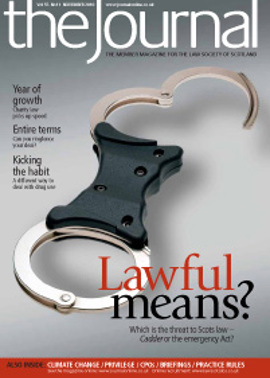Tackling bullying and harassment

In National Anti-Bullying Week, the Society invites you to respond to new research into bullying and harassment in the profession. Interviewees from Ayrshire to Aberdeen have contributed to a new study designed to explore the impact and experience of bullying and harassment.
The research follows the 2007 Profile of the Profession survey, in which 22% of the 3,000 respondents felt they had been discriminated against at some point in their career.
The Society is now seeking responses to inform development of its strategy to implement the recommendations.
Impact and prevalence
The aim of the study, carried out by Equality Works, was to explore personal experiences and statistics, to learn more about the prevalence of bullying and harassment in the profession, and to find out whether some groups are particularly affected.
An open invitation to participants resulted in 15 in-depth interviews with respondents across Scotland, from senior solicitors to trainees.
- Data from the 2007 survey were also re-examined to reveal a particular impact on some groups:
- more than a third of those experiencing discrimination were under the age of 35;
- women represented 50% of respondents, but 78% of those harassed and 82% of those bullied;
- solicitors being bullied were also more likely to be: from non-white backgrounds, lesbian, gay or bisexual, disabled, working part-time and aged between 36 and 45.
This is consistent with data from Law Care which show that 64% of calls about bullying and harassment were from women. The vast majority had less than five years' post-qualifying experience and of these 87% were trainees.
Interviewees in this study also reflected this pattern - 69% of those who contacted researchers were women and 62% were aged between 26 and 35.
The majority of interviewees were qualified solicitors (three months' to 20 years' post-qualifying experience), although two thirds were trainees or assistant solicitors at the time of the bullying. All worked full time, some in larger and smaller firms in private practice, and some in-house with public bodies.
Interviewees describe how bullying in the profession can be:
- very difficult to recognise in the early stages and not properly recognised by solicitors or line managers;
- "training by humiliation", e.g. allocation of work outwith experience with insufficient support/advice;
- turned into an (unfounded) matter of performance, where the victim is blamed for the bullying behaviour;
- repeated at some firms, with predecessors and successors having identical experiences;
- not addressed because of reluctance or inability to deal with senior/high fee-earning perpetrators (both women and men);
- very high cost in terms of stress and health - reduced performance, long term sickness absence and eventual exit were common.
Fear of losing a traineeship is so great that it leads many new entrants to the profession to endure bullying behaviour for as long as they can, rather than report it. For the profession, the impact on turnover and productivity is clear.
Recommendations
Three recommendations have been identified, based on the interim research findings:
1. Build awareness across the profession
This will require firms, universities and professional networks, e.g. TANQ and SYLA, to work together with the Society to inform and support people at all levels, and to promote early information and prevention.
2. Support firms to build skills
It is important for firms of all sizes to further develop their management practice, to recognise and respond effectively to bullying behaviour, and provide effective support for trainees, and women solicitors, supported by the Society.
3. Ongoing monitoring
Monitoring is key to identify and prevent patterns, stimulate action and monitor change. The Society is well placed to monitor levels of bullying and harassment and to work with firms to prevent repeated patterns.
Invitation to respond
Neil Stevenson, the Society's Director of Representation and Professional Support said:
"The Society welcomes comments and responses to this important research. We actively invite suggestions from the profession to help shape our strategy to implement the recommendations of the report.
"Planning is already underway for the next Profile of the Profession Survey which we will compare with 2007 results and measure any change.
"Next steps include publication of case studies from the research, and developing further best practice guidance, building on the 'Ensuring Fairness, Creating Opportunities' guide published last year."
A full copy of the research report will be available on the Law Society of Scotland website later this month – www.lawscot. org.uk/diversity
A separate study is currently underway to examine the experience of black and minority ethnic trainees and the research team are keen to hear from potential participants – see www.lawscot.org.uk/ diversity
Helen Ketcher, Senior Client Consultant, Equality Works. t: 0161 200 8540. w: www.equalityworks.co.uk
In this issue
- In the wee small hours
- Keeping the law in line
- Only a civil matter?
- Mapping the future
- Rights under question
- What help?
- Shunned lifelines
- The whole deal
- The limits of privilege
- Drugs: a user issue
- Law reform update
- Constitution out for views again
- Tackling bullying and harassment
- First registered paralegals confirmed
- Mediation lawyers can apply
- Look out for the rules reviews
- From the Brussels office
- Are they being served?
- Ask Ash
- Paper, pixel and process
- Check yourself
- Call for restraint
- A step back from compensation?
- Key to compliance
- Website review
- Resource issue
- Book reviews
- Stand up and be counted
- Cool drafting
- Partners in purchase






